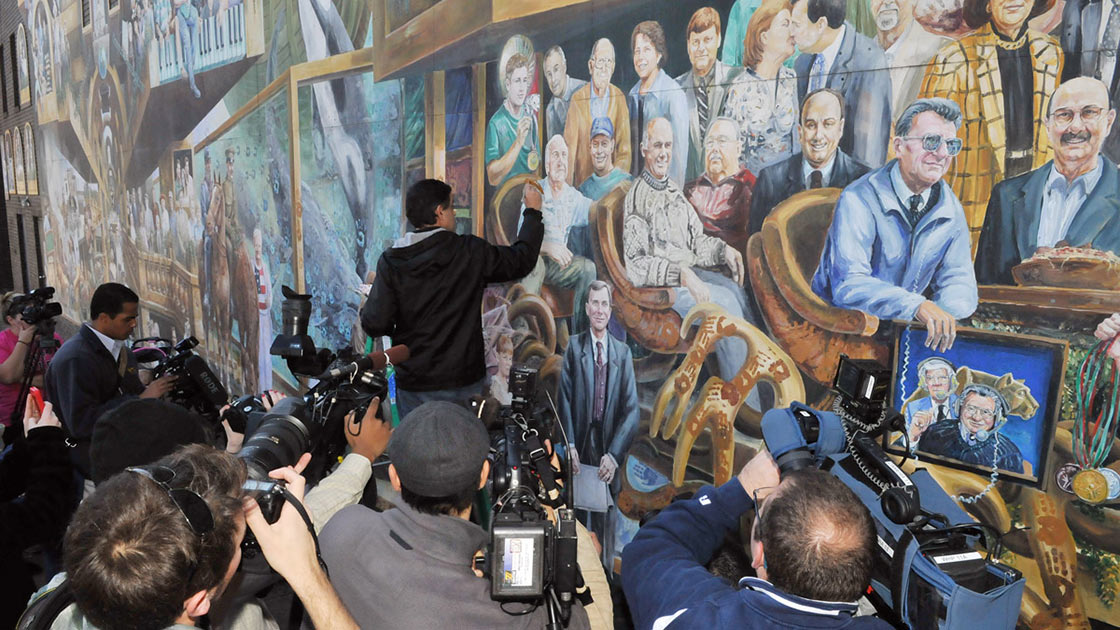By providing your information, you agree to our Terms of Use and our Privacy Policy. We use vendors that may also process your information to help provide our services. This site is protected by reCAPTCHA Enterprise and the Google Privacy Policy and Terms of Service apply.
Why ‘Happy Valley’ May Change Your Mind About the Penn State Scandal

Everyone loves a scandal. But, when a scandal comes to light
and media sensationalism intensifies, the public’s perception often supersedes
the truth. In both his documentaries, “My Kid Could Paint
That” and “The Tillman Story,” Emmy Award-winning Director Amir Bar-Lev consistently and skillfully deconstructs the perceived truth of a
controversy and challenges his viewers to open their minds to the story that
hasn’t been told publicly. In his latest documentary, “Happy Valley,” Bar-Lev
reopens the floodgates of the Penn State child sex abuse scandal that broke in
2011.
READ MORE: “My Kid Could Paint That” Director Amir Bar-Lev
The film, which first
premiered at the Sundance Film Festival in January, is a transfixing examination
of the hideous crimes and aftermath that sent a shockwave through the Penn
State community. The simplified story is that Jerry Sandusky, the former
assistant football coach at Penn State was convicted of molesting multiple
underage boys over a 15-year period. Joe Paterno, the legendary and beloved
head football coach, was fired and defamed for allegedly covering up Sandusky’s
crimes. He died from aggressive lung cancer shortly after the scandal broke. The
NCAA fined Penn State 60 million dollars and university officials were asked to
resign. Most devastating to the community though was that its football program,
which was revered for its upholding of academic and athletic standards, along
with “JoePa,” was utterly disgraced.
But there is more to it
than that. Bar-Lev’s film aims to expose the deep complexities and moral
ambiguity of a narrative that the public didn’t seem to fully understand at the
time. While the film certainly fosters a bias, as any documentary does, it
generally offers a well-balanced argument by showing empathy for both the
victims of Sandusky’s abuse and the Paterno family as well as critiquing the
Penn state community for its pervasive football fandom culture that may have
enabled the cover up of the crimes. While the film may seem paradoxical by
nature, Bar-Lev seamlessly communicates the message through his interviews with
the devastated Paterno family, die-hard Penn state fans, and most poignantly,
Matt Sandusky, Jerry Sandusky’s adoptive son who came forward as one of the victims
of sexual abuse.
 Filmmakers Barbara
Filmmakers Barbara
Kopple and Steve James hosted a screening of the A&E Indiefilms produced “Happy Valley” for a New York
audience last night and NBC sportscaster Bob Costas introduced the film.
Costas’ involvement with this story started in 2011 when he gained acclaim for
his live telephone interview with Sandusky about his crimes. Costas prefaced
the film by explaining, “What much of America and what much of the media
decided was the truth a couple of years ago is largely in doubt right now.
There are so many areas of gray. There are so many areas of nuance that were
passed over. There are so many questions as yet unanswered.”
What may have been lost on a New York audience is that
football is not just a sport in the town of State College, PA. It’s the
culture. It’s a way of life. Thus, the question being asked during the time of
the scandal was: did football come first? As Costas put it, “the easy narrative
became we were all fooled and football became king. Maybe not in the way that
it’s king at Alabama or Texas or Florida State, but it became king in a different
way and it blinded people to what was going on and it skewed the sense of
morality.”
 Costas warned the audience “The film doesn’t as much take
Costas warned the audience “The film doesn’t as much take
one side as it shows all sides. It shows not just the various facts or versions
of events that there are to be considered, but also the various perspectives
and deeply held emotions that people feel about this case. So is it the entire
truth? No film, no matter how well made, and this one is very well made, can
tell the entire truth. But is it a contribution to the truth? Damn straight.”
The film will be released in theaters on November 19 in New York, and on November 21 in Los Angeles and on the following digital platforms: iTunes, Amazon Instant, Vudu, Google Play and Youtube.
READ MORE: Jerry Sandusky Documentary ‘Happy Valley’ Picked Up by Music Box Films
By providing your information, you agree to our Terms of Use and our Privacy Policy. We use vendors that may also process your information to help provide our services. This site is protected by reCAPTCHA Enterprise and the Google Privacy Policy and Terms of Service apply.


















